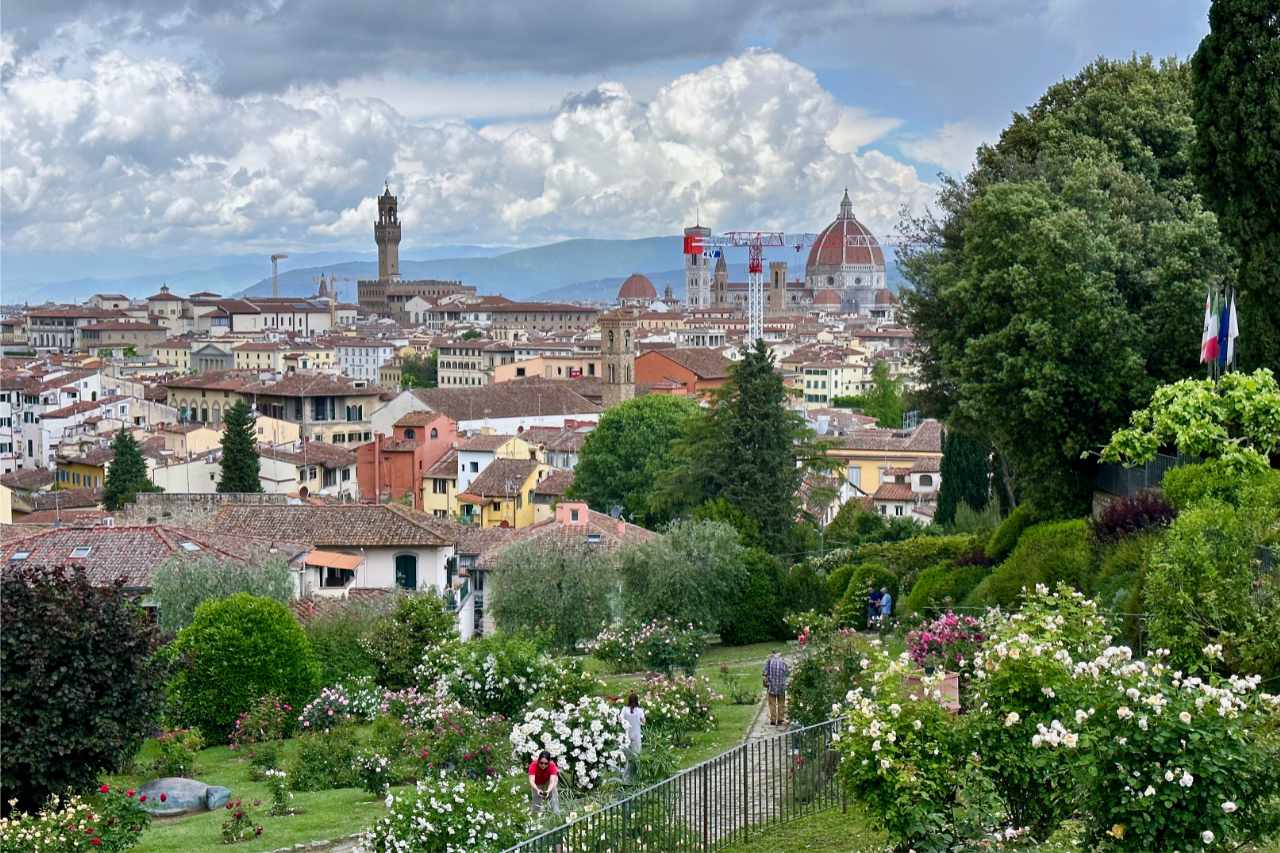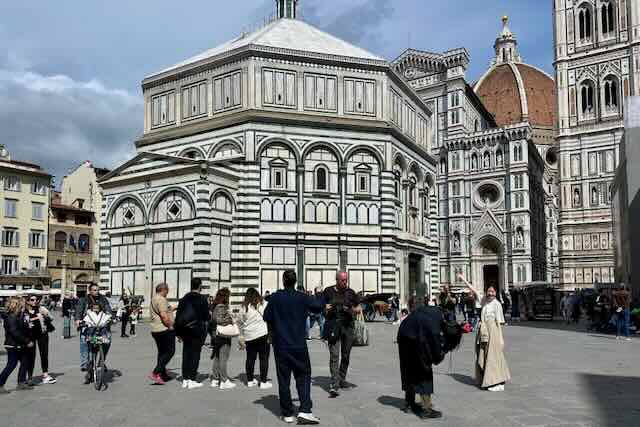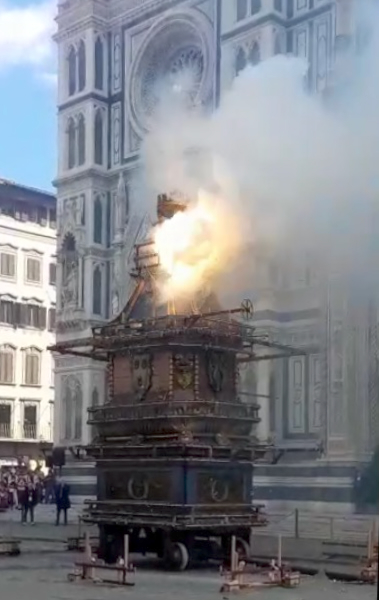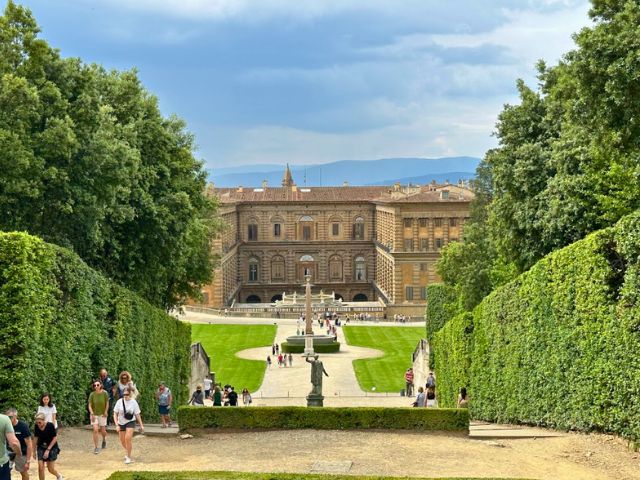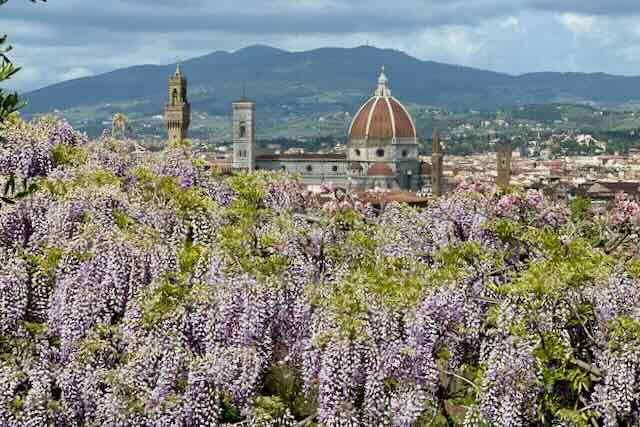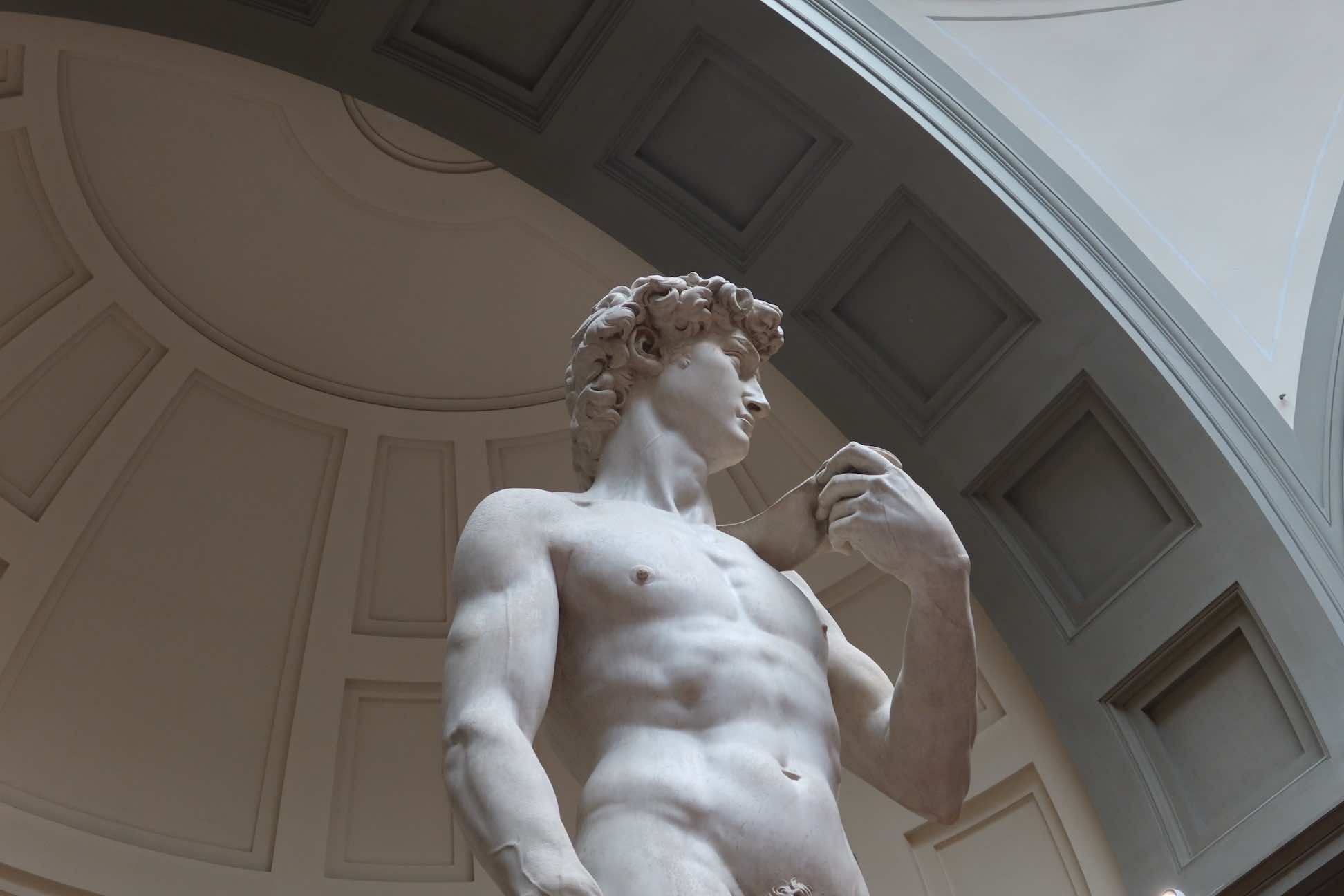- Sign up & get a FREE ebook Subscribe Today! Our New Italy Travel Website Is Here Visit Napleswise Now!
- Florencewise Home Page
- florence in spring
Florence in Spring - A Perfect Time to Visit!
Are you thinking of skipping the Tuscan countryside and visiting bustling Florence in spring?
Offering excellent (if slightly rainy!) weather, incredible festivals, and gorgeous manicured gardens, it’s an amazing time to visit Florence.
Everything you need to know about how to visit Florence Italy in the Spring
With world-famous museums, centuries of history, and Renaissance gardens to discover, Florence is a dream destination for many.
But you might be surprised to find out that there are no real quiet months if you’re visiting during springtime.
That’s right, summer ISN’T generally peak season in Italy, it’s typically more crowded between April and June!
So, if you’re trying to make the most of your vacation (and cover the most unique things to do in Florence!), you’ll want to keep reading.
On this page you'll find:
- Is spring a good time to visit Florence?
- What's the weather like during the spring in Florence?
- Tips on what to pack and what to wear
- Details of some of the spring events and holidays that take place in Florence
- Suggestions for the best things to do in Florence Italy in the spring
- Seasonal food to look out for in Florence in spring
Is spring a good time to visit Florence?
YEP – spring is possibly the best time to visit Florence.
Not only is the winter chill starting to fade away (hello, strolls along the river Arno!), but you can catch part of the city’s shoulder season for cheaper rates in early spring.
The perfect sightseeing weather means the crowds can get quite heavy as the season goes on, but this is also when the many garden and park options will be at their best.
So for me, it’s worth persevering with the crowds, even if this means popular city sights like the Uffizi Gallery, Piazzale Michelangelo, Duomo and Accademia Gallery are busier.
Oh, and because this time of year is great for fresh produce, you can easily stock up on greens and seasonal fruit at the local markets.
Is the spring high season or shoulder season in Florence?
Early spring is part of Florence’s shoulder season, and the peak period tends to hit around Easter.
That’s largely because the city gets good weather, longer daylight hours, and the gardens are blooming.
But it’s also because Florence gets a rush of visitors around Easter.
Easter is a very popular time of year to travel within Europe, especially when combined with Florence's unique Easter celebrations and the Easter mass at the Duomo.
The city then gets busier and busier as the season goes on.
People like to avoid the intense heat during the summer months so if you visit earlier in the year, don't expect fewer crowds.
I recommend booking popular sites well in advance to avoid missing out.
Spring weather in Florence
Spring in Florence is when you’ll start experiencing warm weather, but there’s still a high chance of rain at the start of the season.
It’s nothing like the balmy heat of the summertime, but temperatures rise significantly by early June.
You can generally expect warm days and chilly nights from March until early April with highs and lows hitting 16°C/61°F and 6°C/43°F.
In May, temperatures reach the mid 20's Celsius/mid 70's Fahrenheit during the day, although the evenings can still be on the cooler side.
By the time we get to early June, the temperature is starting to soar, with daily highs averaging 29°C/82°F and mild evenings averaging 16°C/61°F, with the city getting ready for the summer hot weather.
In terms of rain, watch out for those April showers as more often than not we get some rainy periods.
Bring a travel umbrella and/or light jacket with you when out and about in case of unexpected showers!
What to pack and what to wear in Florence during spring time
It’s easy to overpack if you’re visiting Florence in springtime.
But you just need to make sure you have reliable rain gear (for those showers!), a trusty jacket, and light layers.
5 things to bring with you no matter the season
- A hat: It’s not the height of summer yet, but the sunshine can still be strong! A lightweight visor, cap, or wide-brim hat will set you up for success.
- Comfortable shoes: I recommend walking shoes for tackling Florence’s streets. If that’s not your style, sturdy trainers or boots should work (just make sure they’re broken in!).
- A scarf: Italians are all about styling with scarves, and they’re also a multi-purpose accessory that’ll keep you warm on chilly evenings!
- Anti-theft bag: It’s a sad fact, but you’ll find pickpockets all over the entire city. Think about a bad that is tricky to get into, a theft-proof backpack or messenger bag make great picks.
- Travel insurance: This isn’t an exaggeration – don’t leave home without comprehensive insurance that covers medical emergencies and baggage loss. Just don’t do it!
🔐 Store your bags and luggage securely! 🧳
We're parterned with Radical Storage who have locations across Italy for you to keep your luggage safe before and after check-in, while on day trips and for everything else between 👌
Click here to book now and use code FLORENCEWISE to save 5%!
Packing for a spring trip to Florence Italy
Florence’s dress code is relatively casual, and lightweight trousers, skirts, dresses, and well-cut jeans are all valid base layers from March through May.
You can layer these with tights or leggings for cooler days and even rock shorts if you’re visiting in early June.
But the key to nailing spring packing is bringing plenty of layers.
So, light t-shirts, thermal layers, jackets, and cardigans are all great things to have on hand for each month.
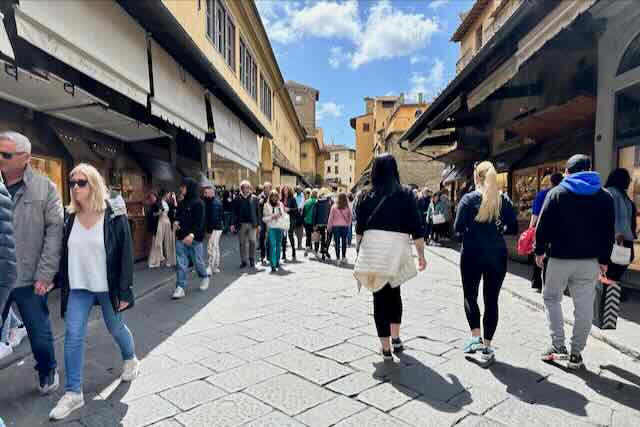 You can see how people are dressed on this typical April day, lighter layers but those rain jackets are close to hand!
You can see how people are dressed on this typical April day, lighter layers but those rain jackets are close to hand!You shouldn’t need thick socks during spring, but they’re great to have under walking boots in March when it’s still chilly.
For any month, you need to have an umbrella on hand.
Although it’s wettest in April, you should expect to see at least a little rainfall when exploring the city!
No matter what season you visit Florence, here are 4 things never to leave at home:
Disclosure: If you make a purchase through a link on this page, I may receive a small commission - at no extra cost to you. Thank you for supporting my site!
Spring events in Florence
MARCH 8: FESTA DELLA DONNA
March 8 is International Women’s Day, and most locals celebrate with yellow mimosa flowers everywhere.
From grocery stores to shop windows and restaurants, the flowers are on display and gifted to women.
It is not a public holiday so nothing will be closed.
EASTER SUNDAY: EXPLOSION OF THE CART
If you’re in Florence at Easter, you’ll want to catch the Explosion of the Cart - Lo Scoppio del Carro in Italian.
On Easter Sunday, an antique cart is filled to the brim with fireworks and set off outside Florence Cathedral.
This tradition is said to date back to the First Crusade in 1099 where a Florentine scaled the walls of Jerusalem and displayed a Christian banner.
When he returned home, he brought back flints from the Holy Sepulchre and used these to set torches alight that were carried around the city.
The tradition evolved to the firework display we have today - read more about it on our dedicated Easter page!
EARLY TO MID MAY: SAGRA DEL CINGHIALE
Fans of wild boar will want to head to the nearby village in Tuscany of Suvereto for the Sagra del Cinghiale (Wild Boar Festival).
It’s one of the oldest festivals in Tuscany and features boar-related art and carvings as well as lots of tasty food.
But the best part is that you can sample excellent local white and red wine from the Val di Cornia!
APRIL 25: LIBERATION DAY
Commemorating the end of Fascism and Nazi rule during World War II, this is a big holiday here, especially if it falls near Easter.
MAY 1: MAY DAY
This is another public holiday in Italy, but most sites and museums stay open so it shouldn't impact your visit much.
MAY 23: FIORITA COMMEMORATION
Every year on May 23, Florentines will gather in Palazzo Vecchio to honor the Dominican friar Girolamo Savonarola who was burned at the stake here in 1498.
Savonarola was a very popular preacher who temporarily overthrew the Medici ruling family in 1497 when he whipped the city into a frenzy.
His influence didn't last long, being convicted of heresy by the pope in Rome the following year and condemned to death.
During the annual remembrance ceremony, flowers are laid down on the spot where his pyre was built in Piazza della Signoria, before a historic procession winds its way to the river where rose petals are thrown into the Arno River.
JUNE 2: FESTA DELLA REPUBBLICA
Celebrating the day Italy became a republic and abolished their monarchy in 1946, this is one of the main holidays here.
As a public holiday, expect shops, banks and some restaurants to be closed, but in general most sights are open and you will not struggle for things to do.
The best things to do when you visit Florence during the spring
 Visiting Santa Maria Novella should be on your itinerary no matter when you come to Florence, but what are some spring-specific things to do?
Visiting Santa Maria Novella should be on your itinerary no matter when you come to Florence, but what are some spring-specific things to do?I highly suggest hitting some of the following hot spots as well as exploring Florence's seasonal offerings, as they are must-visit attractions whatever time of year you visit:
- Uffizi Gallery
- Piazzale Michelangelo
- Ponte Vecchio
- Basilica of Santa Croce
- Duomo Complex
- Accademia Gallery
- Pitti Palace
- Piazza della Signoria
- Basilica of Santa Maria Novella
But if you’re looking for seasonal things to do, here are a few ideas:
Stroll through blooming gardens
Renaissance gardens started their life in 15th century Florence and Rome, with garden design becoming an art form.
The most famous have been well preserved in Florence so it would be a shame to miss the beautiful Boboli and Bardini Gardens when they’re in full bloom!
Along with the tree-lined paths in the Boboli Gardens you’ll also find Renaissance statues and a view of the glorious Pitti Palace.
You can get a combo ticket for the palace as well if you like.
If you head to the Bardini Garden (attached to Villa Bardini), you’ll get a wonderful panoramic view over Florence because it’s perched on a hill that’s surrounded by the city’s medieval walls.
P.S: Grabbing a ticket to the Boboli Gardens automatically grants you access to the Bardini Gardens for free!
You can also visit the Giardino Dell’Iris, a botanical garden that’s known for its stunning iris flowers (hence the name!) and the Rose Garden.
The iris has been a symbol of Florence since 1251, and the Iris Garden houses over 2,500 varieties of the iris flower.
The only catch is that the garden is only open to the public for around 25 days a year between April and May.
So, if you’re visiting Florence at this time you can stroll through the 2.5-hectare park and admire irises from the Far East to the Americas!
The amazing Rose Garden (Giardino delle Rose) is perfect for a romantic walk, filled with roses from all over and with Florence's skyline as a backdrop, just down the hill from Piazzale Michelangelo.
Check out the May Music festival
Music lovers visiting Florence in spring should try and slot the Florence May Music Festival into their itinerary.
The festival is known for its amazing operas, concerts, prose readings, and ballets.
It runs between April and July each year and is designed to celebrate the joy of springtime with performances that chase away the winter blues.
Check out our top tips for making the most of your time in Florence:
Go on a bike tour
If you don’t feel like schlepping through medieval streets on foot, why not hop on a bike?
There are several excellent bike tours that take you around some of the city’s best attractions.
Most of them head to Piazza della Signoria, Santa Croce, Palazzo Pitti, Ponte Vecchio, and the Duomo, and some include entrance or even a tour of the Uffizi or Accademia Galleries.
But it’s always worth checking exactly what’s included (especially which museums!) to make sure you can tick everything off your list.
Celebrate Florentine New Year
Outsiders aren’t always aware of this, but Florentines traditionally celebrate New Year on March 25 instead of December 31!
It’s a holiday in Florence that dates back to the Middle Ages.
The city used to celebrate the New Year on the Catholic feast of the Annunciation, March 25.
When the Gregorian calendar was introduced in the 1500's, which set the start of the year on January 1, Florence chose to ignore this and still set March 25 as its New Year.
 At the end of the procession in the Piazza della Santissima Annunziata there is a market set up with stalls
At the end of the procession in the Piazza della Santissima Annunziata there is a market set up with stallsThis didn’t change until 1749 when Grand Duke Francesco III finally decreed that the calendar year started on January 1!
You should expect a historical procession from Piazzetta di Parte Guelfa to Piazza della Santissima Annunziata.
You can also pick up brigidini (small liquorice wafers) flavored with anisette from most street stalls on the day.
What foods are in season in spring?
If you want to live as the Florentines do, you should try to eat seasonally.
At this time of year, you’ll spot spring veggies like asparagus, peas, artichokes, zucchini flowers, leeks, and beets popping up at local markets.
Join Devour Tours for a sunset food adventure in Florence's Oltrarno district! Taste Tuscan delights from street bites to traditional dishes!
I highly recommend strolling into restaurants and sampling Piselli alla Fiorentina.
It’s a spring-style (and local!) recipe made with peas, bacon, garlic, and parsley.
For something heavier, try a traditional frittata con verdure (omelet with veggies) or a satisfying garmugia (a spring soup from Tuscany).
Receive the latest Florence news, travel tips, insights and more!
Simply sign-up today for our free newsletter:
We are committed to respecting your data. Click for our Privacy Policy.
Comments? Questions? Suggestions?
Please come over to the private Facebook group and join in the conversation.
You will often find me there, happy to answer your questions / comments!
You will also meet other Florence lovers and experts, too.
What are you waiting for?

